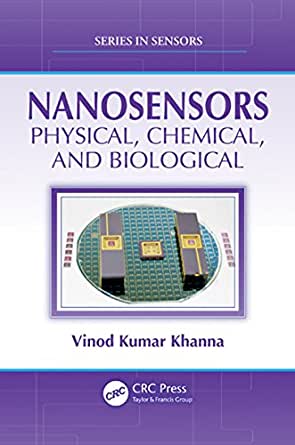Newly released
This book is new and will be uploaded as soon as it becomes available to us and if we secure the necessary publishing rights.

Nanosensors : physical, chemical, and biological Book PDF
(0)
Author:
Vinod Kumar KhannaNumber Of Reads:
64
Language:
English
Category:
TechnologySection:
Pages:
630
Quality:
excellent
Views:
808
Quate
Review
Save
Share
Book Description
Bringing together widely scattered information, Nanosensors: Physical, Chemical, and Biological explores sensor development in the nanotechnology age. This easy-to-read book presents a critical appraisal of the new opportunities in the area of sensors provided by nanotechnologies and nanotechnology-enabled advancements.
After introducing nanosensor classification and fundamental terms, the book outlines the properties of important nanomaterials and nanotechnologies used in nanosensor fabrication. Subsequent chapters are organized according to nanosensor type: physical (mechanical and acoustical, thermal and radiation, optical, and magnetic); chemical (atomic and molecular energies); and biological. The final chapter summarizes the current state of the field and discusses future trends.
A complete and authoritative guide to nanosensors, this book offers up-to-date information on the fabrication, properties, and operating mechanisms of these fast and reliable sensors. It addresses progress in the field, fundamental issues and challenges facing researchers, and prospects for future development.
Vinod Kumar Khanna
Vinod Kumar Khanna born on November 25, 1952 at Lucknow, Uttar Pradesh, India, is an Emeritus Scientist at CSIR-Central Electronics Engineering Research Institute, Pilani, Rajasthan, India, and Emeritus Professor, AcSIR (Academy of Scientific and Innovative Research), India. He is former Chief Scientist and Head, MEMS and Microsensors Group, CSIR-CEERI, Pilani, and Professor, AcSIR. During his service tenure of more than 34 years at CSIR-CEERI, starting from April 1980, he worked on various research and development projects on power semi- conductors devices (high-current and high-voltage rectifier, high-voltage TV deflection transistor, power Darlington transistor, fast switching thyristor, power DMOSFET and IGBT), PIN diode neutron dosimeter and PMOSFET gamma ray dosimeter, ion-sensitive field-effect transistor (ISFET), microheater-embedded gas sensor, capacitive MEMS ultrasonic transducer (CMUT), and other MEMS devices. His research interests were micro- and nanosensors, and power semiconductor devices. From 1977 to 1979, he was Research Assistant in the Physics Department, Lucknow University. Dr. Khanna’s deputations abroad include Technische Universität Darmstadt, Germany, 1999; Kurt-Schwabe-Institut für Mess- und Sensortechnik e.V., Meinsberg, Germany, 2008; and Institute of Chemical Physics, Novosibirsk, Russia, 2009. He also participated and presented research papers at IEEE-IAS Annual Meeting, Denver, Colorado, USA, 1986. Dr. Khanna received his M.Sc. degree in Physics with specialization in Electronics from the University of Lucknow in 1975, and Ph.D. degree in Physics from Kurukshetra University, Kurukshetra, Haryana, in 1988 for his work on thin-film aluminum oxide humidity sensor. A fellow of the Institution of Electronics and Telecommunication Engineers (IETE), India, he is a life member of Indian Physics Association (IPA), Semiconductor Society (SSI), India and Indo-French Technical Association. Dr. Khanna has published nine books, six chapters in edited books, and 181 research papers in national/international journals and conference proceedings; he holds two US and two Indian patents.
Book Currently Unavailable
This book is currently unavailable for publication. We obtained it under a Creative Commons license, but the author or publisher has not granted permission to publish it.
Rate Now
5 Stars
4 Stars
3 Stars
2 Stars
1 Stars
Nanosensors : physical, chemical, and biological Quotes
Top Rated
Latest
Quate
Be the first to leave a quote and earn 10 points
instead of 3
Comments
Be the first to leave a comment and earn 5 points
instead of 3